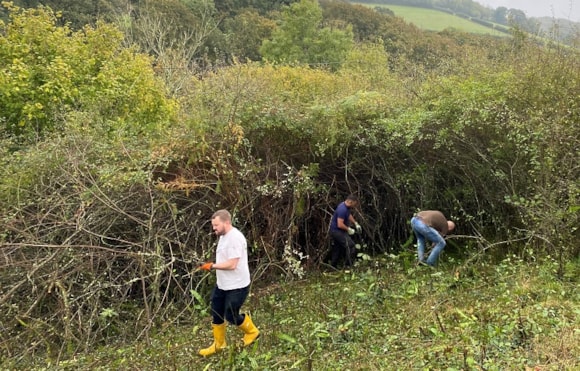A declining butterfly species will have the chance to flourish thanks to conservation efforts made near Ashburton.
Nine volunteers from National Grid Electricity Distribution (NGED) spent a day clearing vegetation to create a suitable habitat for the brown hairstreak butterfly at the Barn Owl Trust’s reserve near Ashburton.
Harsh hedge-cutting regimes have resulted in a dramatic decline in the species and the brown hairstreak butterfly is now classed as ‘vulnerable’ and is on the GB Conservation Red List.
However, brown hairstreak butterfly eggs have been identified at the Barn Owl Trust and volunteers have been working to improve the habitat to encourage colonies.
The volunteer team cut back areas of mature blackthorn to encourage the younger growth that the brown hairstreak prefers for egg laying.

‘Colonies are usually based around a wood, but females will span over several miles of surrounding countryside, requiring a complex of not only woodland and hedgerows but an abundance of suitably managed blackthorn,’ explained Barn Owl Trust reserves officer and volunteer coordinator Harry Hingston.
Clearing the older blackthorn won’t just benefit rare butterflies, the work will also encourage the re-establishment of rough grassland. The long, thick, matted, tussocky mix of native grass species are an ideal habitat for field voles, which are the main food source for barn owls and other wildlife.
‘We had a very enjoyable and informative day and it was good to have a noticeable impact on an area that will benefit wildlife,’ said NGED head of operations for Devon Lewis Smith. ‘It’s great to support a Devon-based charity that is working hard to conserve barn owls and, in the process, boost diversity,’ he added.
The team took part in the conservation work as part of an NGED employee volunteering scheme that aims to deliver 14,000 hours supporting regional charities and organisations each year between now and 2030.



[60].jpeg?width=209&height=140&crop=209:145,smart&quality=75)
